
|
Note ye ed's email address: stevebryant99@gmail.com. |

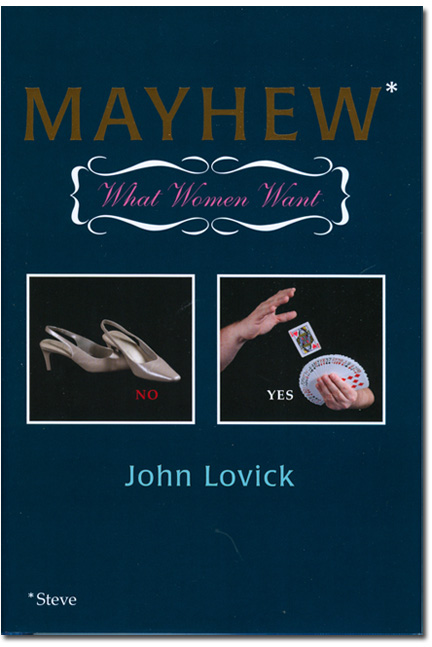
Book of the month.
|
In case you missed it, check out last month's Magi-fest issue. Josh and Andi and Tim Moore threw the first great party of the year. |
March 2014 What strange twists and turns one's interest in magic takes. Back when I was starting up and spending all my time on The Little Egypt Gazette, Stephen Hobbs was putting out his journal Labyrinth, with a printing of 100 copies per issue and the journal running from 1994-1999. One of his significant contributors was Steve Mayhew. Although I missed out on that initial information, it is pleasing to see Mr. Mayhew and Mr. Hobbs represented this month with new offerings. Also up this month, a look at two-person codes by Morgan & West, at a young J.C. Wagner, and at a Saturday matinee magician. |
|
|
DEVIL OR ANGEL, I CAN'T MAKE UP MY MIND -- Sorry, I've got Neil Sedakis in my head. Steve Mayhew, who first came to my attention via his Angels May Shuffle But the Devil Still Deals manuscript, has just released a rich lode of card magic under the title Mayhew/What Women Want, by John Lovick. The bad (?) news first: some of this material is difficult. One of the routines, for example, makes it appear the you are dealing 26 cards from seemingly unknown locations in the center of the deck, the secret being that you are dealing 26 perfect strike seconds. This sort of faux dealing has always been a quandary for me. I think that if I could deal perfect seconds, I would rather demonstrate my real skill at dealing seconds than a fake center deal. ( I say think because I can't deal undetectable seconds; perhaps if I could, I would think differently.) That said, this is a really entertaining routine for those who can master it. The more I think about this, the more I think it a privilege to occasionally read material that is beyond my abilities, and certainly a privilege to see it in action. Whether I can and will perform it is not a valid figure of merit. The author, John Lovick, is currently working on a book that will contain all his Handsome Jack material. Although I look forward to reading about how he invents that character and performs his magic, I have no desire to reinvent myself as Handsome Steve. (That would be a bigger stretch than learning to deal seconds.) The better news, for those looking for new material, is that plenty of the routines here call for only moderate skill, and some are totally self-working. These comments especially apply to the Gambling chapter, my favorite. No one is going to complain about a lack of stunning new magic and gambling demonstrations. To highlight a few favorites: Cuts Like a Mayhew is an extended routine in which you consistently cut a higher card than the spectator. And it all begins with a shuffled deck! Take It or Sleeve It is one of several routines that take advantage of the Angels May Shuffle stratagem, which allows the spectator to shuffle the deck before dealing two nice pat hands. In this one, cards up the spek's sleeve and the magician's sleeve improve these hands for an impressive climax. Labyrinth Blackjack is the second best blackjack routine I know of and the most surefire. Using a card counting premise, you examine part of the deck, determine whether the deck is in your favor, and then offer to either deal or let the spek deal. Either way, with five blackjack hands you win, no matter what the spek does. There is a lot of play value to this item. Old Lazy Fat Guy Cull is a dead-easy way to cull four of a kind (or a royal flush, etc.) from a shuffled deck, no skill required. The premise, that is, what you are purporting to be doing, would also work fine with the Hamman Cull. Mayhew's World is a genuinely new presentation for OOTW; there is no "red here-black here" getting into it. Delores in a Meadow will allow you to fake a second deal even if you can't do one, and its climax is delightfully weird, reminding me of some of Dominique Duvivier's routines. Wet or Black directs the spek to cut a deck into eight piles. Following a series of intimate questions, the spek announces red or black. Accordingly, all eight piles are shown to have the named color on top. There is no equivoque, no multiple endings. Das Kapital is a way cool bill switch routine. This is the best routine of its kind I have read in which the switches (one to twenty, twenty to one, etc.) make sense and create some real amusement. Lucky performers may have already discovered it in Labyrinth or Switch. 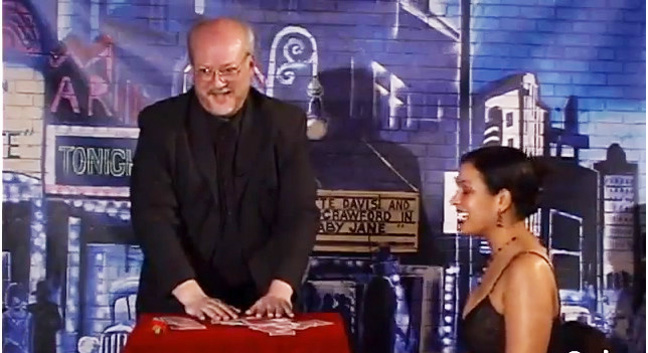 Mayhew can walk the walk. Although I know it isn't necessarily true, and can name names to contradict this, I tend to think of card men with extraordinary chops as less entertaining than other top closeup performers. Two reasons I do not think this about Steve Mayhew: first, the scripting in all these routines is excellent and original; there are no hack lines, and most of it is really funny. Second, Mayhew has a promo tape that is easily accessible on Youtube, and you can see that he is warm, funny, and lovable, just great with spectators. (I mention this only because I've not had the good fortune to have seen him perform in person. The brief clips have only enhanced my appreciation of this material.) There is a lot of playfulness in the book, as you might expect from its title. The playfulness not only evidences itself in the humor in the text (Lorayne-like Afterthoughts are cast here as Blah Blah Blah, for example) but to the design: letters in titles fall down, flip over, tumble off the baseline, fade to invisibility, vibrate, and so on. Footnotes become a main source of pleasure, and despite their impudence, I could not find one for which I could cite an older or more accurate reference. And I tried. These tricks are very well documented. (I've no idea where to assign credit between Mayhew and Lovick; my assumption is that both contributed to the joie de vivre and to the erudition of this work.) Blah, blah, blah: Hardback, 294 pages, entertainingly and technically well-written, physically of the usual Hermetic Press high quality, illustrated with crisp photos, a mere forty bucks. This is one more proof that books are the best bargain in magic. I got mine direct from Hermetic Press. |
|
|
CLASS ACT -- Stephen Hobbs, former publisher of Labyrinth, co-editor of The Looking Glass, and author of several books on magic, is back with an amazing new magazine, a projected 52-issue journal he describes as "a free web 'zine devoted to powerful and practical sleight-of-hand with cards." The 'zine, called Stephen Hobbs' Technical Toolbox, is scheduled to run weekly throughout 2014, and be aware that the project could be terminated at any time. To date, eleven issues are up, and the quality is fantastic. Tune in often and don't miss out. Via video, Hobbs teaches practical card moves and tricks using those moves. The videos are handsomely packaged in a slick, organized web site. Titles for all 52 issues are posted, and it's easy to get excited over what is coming up. One of the tenets of Marketing Lessons from the Grateful Dead is "free your content." (The Dead not only allowed but encouraged their concerts to be taped and shared. Giving away bits of the product counterintuitively generated vastly more interest and customers for future concerts and record sales.) I don't know if this is Hobbs' strategy in giving away this material--it will eventually become a much sought after compilation--or whether he is simply being generous, but he certainly has my attention. 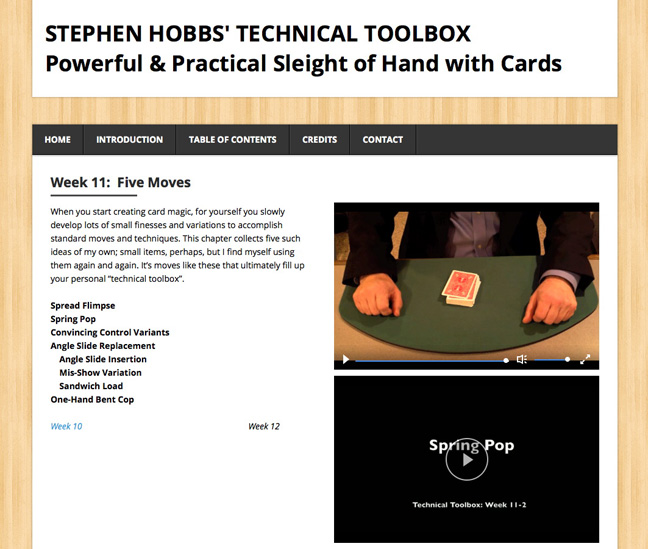 This should be on iTunes U. Not even counting the work it took to devise these interesting moves and magic tricks, Stephen Hobbs has put a lot of work into this teaching project. Check it out yourself at Stephen Hobbs' Technical Toolbox. |
|
|
BRAINWAVES -- Last month's review of Magi-fest mentioned the charming, funny act of Morgan & West, two young time traveling magicians from London. There is some deep thinking behind this comedic act, some of which is on display in their monograph on two-person code acts, Transmission of Information. A quick Google tour of the boys' history explains why we should expect clever things from them. The two met at Oxford, where their studies prepared Rhys Morgan (nee Jones) to teach math and physics and Rob West (nee Hemmens) to teach chemistry and physics. They eventually opted out of their secondary teaching gigs at King Alfred's Academy to become full time performers, having scored well at the Edinburgh Fringe Festival and other live venues and having fooled Penn and Teller.  I know what you're thinking. Transmission of Information is 57-page booklet similar in size and format to Justin Higham titles. Its scope is an overview of two-person code acts. It's a thoughtful analysis of such methodologies rather than one or more specific codes. The analysis does take in how they fooled Penn and Teller through Tamariz-like cancellation, with a one-time technique. Interesting reading if you are into code act concepts. Softbound, still 57 pages, $24. I got mine from H&R Magic Books. |
|
|
EARLY SECRETS -- I'm a fan of L&L Publishing's $9.95 e-books, and this month is no exception. Louis recently released three books for that total, including his own Lake Tahoe Card Magic, Larry Jennings' Neoclassics, and J.C. Wagner's 7 Secrets. I snapped up the lot primarily to obtain the J.C. Wagner book, which had previously eluded my library.  J.C. reveals all. J.C.'s magic is always extremely direct and practical, and there is some fine magic in this book that did not make it into the later The Commercial Magic of J.C. Wagner. My favorites include his Torn and Restored Card, which set the bar for the many variations on this plot. Ace-Two-Three-Four is J.C.'s four-card elevator routine, Charisma Change is a nice change of anything to anything (coin-sized objects), and Triple Cut for Triumph is a great cutting sequence for your Triumph routine, different from Daryl's. All lovely magic. It was fun to spend some time with a young J.C. Wagner and his young editor, Chuck Martinez. (P.S., the Lake Tahoe book contains one of my all-time favorite tricks, Larry Jennings' The Close-up Illusion.) My iPad is so happy. |
|
|
SATURDAY AFTERNOON AT THE MOVIES -- One of the items I picked up at Magi-fest was a Little Big Book edition of Chandu the Magician. This 4 5/8 by 5 1/8 inch "novelization" of the Photoplay The Return of Chandu, the Magician was published in 1935 by The Saalfield Publishing Company.  A Little Big Book. The film was a twelve-episode serial starring Bela Lugosi in the title role. The book, a delightful little chunk, is a very simple retelling, illustrated with stills from the movie. The Chandu character was created for radio, first launched on the west coast in 1931, and the film was released in 1935. There isn't much to add here; it's just a nice souvenir to have brought home from Magi-fest. I don't recall if Chandu was one of the serials I watched on Saturday matinees, but it was of that ilk. 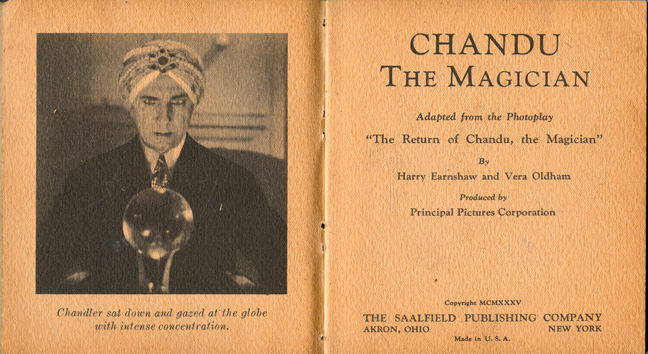 Chandu the novelization. |
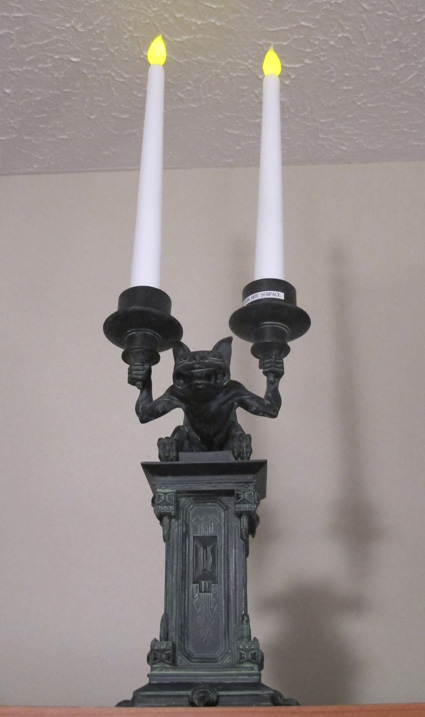 A Christmas gift from the Haunted Mansion.
Work on one trick to show your friends at the conventions.
Little Egypt Magic is the erratically updated web site of Steve Bryant, spawned (the site, not Steve) by a former internet magazine known as The Little Egypt Gazette/for magicians only. Steve Bryant is an obscure magician and writer who generates this site from an iMac in Bloomington, Indiana. He used to frequently journey to and perform magic in Little Egypt, the local name for extreme southern Illinois, where the towns bear such names as Cairo, Thebes, and Karnak. Past issues of this web site: Index to Past Issues Notice: Any limited use of copyrighted images or quoted text is considered fair use, usually to review whatever product or event that is under discussion. If you object to use of any material, please get in touch and it will be cheerfully removed. |
A JSB Creations product
Copyright© 2014 by Steve Bryant